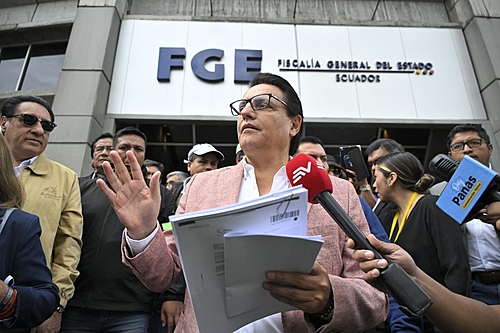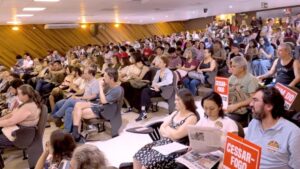
Political leaders from different ideological positions spoke out about the assassination of Ecuadorian presidential candidate Fernando Villavicencio last Wednesday. The case also motivated official demonstrations by the governments of South American countries.
The strongest demonstrations came, naturally, from Ecuador itself. The country is experiencing great instability a few days before the first round of presidential elections, scheduled for the next 20th.
In a post on Twitter, the current president, Guillermo Lasso, said he was “indignant and dismayed”. When announcing measures to identify those responsible, he stated that “organized crime has come a long way, but it will feel the full weight of the law”.
Outraged and shocked by the assassination of presidential candidate Fernando Villavicencio. My solidarity and my condolences with his wife and his daughters. For his memory and for his fight, I assure you that this crime will not go unpunished.
The Security Cabinet will meet in…
— Guillermo Lasso (@LassoGuillermo) August 10, 2023
Most of the reactions from neighboring countries came from ministries of foreign affairs. In Brazil, the Itamaraty published an official note on its website stating that the Brazilian government viewed the case “with deep consternation” and that it trusted the investigation of those responsible. In addition, he offered condolences to the Villavicencio family and the Ecuadorian people.
Equivalent bodies in countries on the continent manifested themselves in a similar way. The Peruvian government said it “strongly” condemned the murder and repudiated “any act of violence and intimidation that affects the development of democracy” on the continent.
The Government of Peru strongly condemns the assassination of presidential candidate Fernando Villavicencio and expresses its firm rejection of any act of violence and intimidation that affects the development of democracy in the region.
– Chancellery Peru 🇵🇪 (@CancilleriaPeru) August 10, 2023
The Colombian Ministry of Foreign Affairs also published a message “vehemently” repudiating the attack that killed Villavicencio and expressed condolences to the dead candidate’s relatives and supporters.
The Colombian Foreign Ministry vehemently rejects the assassination of the candidate for the Presidency of Ecuador, Fernando Villavicencio, in the midst of the attack of which he was the victim during a rally in Quito and expresses its condolences to his family and supporters.
– Colombia Foreign Ministry (@CancilleriaCol) August 10, 2023
Argentina also manifested itself through its Ministry of Foreign Affairs, in a note with a similar tone: repudiating the attack and offering solidarity to family members and close people.
The Argentine Foreign Ministry condemns the assassination of Ecuadorian presidential candidate Fernando Villavicencio, and expresses its solidarity with the people of Ecuador and condolences to his family and loved ones.
– Argentine Foreign Ministry 🇦🇷 (@CancilleriaARG) August 10, 2023
In Brazil, parliamentarians used social media to mourn the attack. Senator Randolfe Rodrigues (without party-AP) classified the act as “an attack on Latin American democracy”, and warned of “the dangers of political fanaticism”.
In a brutal and cowardly act that represents an attack on Latin American democracy, Fernando Villacencio, candidate for the presidency of Ecuador, was assassinated yesterday. The attack makes the dangers of political fanaticism very clear. The struggle for democracy is international!
— Randolfe Rodrigues (@randolfeap) August 10, 2023
Federal deputy Jandira Feghali (PCdoB-RJ) said that he was a victim of political violence resulting from the fight against organized crime and drug trafficking in Ecuador.
Fernando Villavicencio, candidate for the presidency of Ecuador, was shot to death while campaigning at a school in Quito. Villavicencio was yet another victim of political violence resulting from the fight against organized crime and drug trafficking in the country. pic.twitter.com/yDtJq1BCbh
— Jandira Feghali 🇧🇷🚩 (@jandira_feghali) August 10, 2023
Speaking on behalf of the National Congress, the President of the Senate, Rodrigo Pacheco said that “this shocking episode of deplorable political violence demands from us, Brazilian parliamentarians, a great deal of reflection on the directions that our own politics may follow in the coming years”.
“We, members of the National Congress, the Brazilian people, stand in solidarity with our Ecuadorian brothers in this tragic and sensitive moment, while registering our repudiation of this brutal attack and all forms of violence”, added Pacheco.
Right-wing and far-right figures tried to capitalize by commenting on the case. Bolsonarism made a movement on social media to try to associate the case with the stabbing that hit Jair Bolsonaro during the 2018 election campaign.
Former minister and former opponent of former president Jair Bolsonaro (PL), Senator Sergio Moro (União Brasil-PR) was one of the right-wing parliamentarians to demonstrate, and took the opportunity to criticize former Ecuadorian president Rafael Correa.
Political assassination in Ecuador. Presidential candidate Fernando Villavicencio was cowardly murdered. In the past, he had denounced the corruption of the Correa government and, in the present, he advocated strictness against drug trafficking. Latin America cannot become hostage to… https://t.co/7EFoQoQd58
— Sergio Moro (@SF_Moro) August 10, 2023
Editing: Vivian Virissimo
Source: www.brasildefato.com.br

